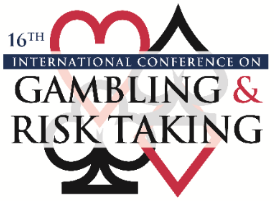Session Title
Session 2-2-C: Research on Effective Problem Gambling Treatment
Presentation Type
Event
Location
The Mirage Hotel & Casino, Las Vegas, Nevada
Start Date
8-6-2016 10:30 AM
End Date
8-6-2016 12:00 PM
Disciplines
Clinical Psychology | Psychology
Abstract
Available evidence suggests that self-help treatments may reduce problem gambling severity and gambling behaviour. However, decrease of gambling among control groups and rare assessment of key variables associated with improvement across studies leave the benefits of self-help treatments for problem gambling unclear. The current study assesses the efficacy of a self-help treatment program including three motivational telephone interviews spread over an 11-week period and a cognitive-behavioral self-help workbook. At-risk and pathological gamblers were randomly assigned to the treatment group (n = 31) or the waiting list (n = 31). Relative to the waiting list, the treatment group presented a significant reduction in the number of DSM-5 pathological gambling criteria met, gambling habits (frequency, money and time spent gambling, and gambling consequences at 11 weeks. Perceived self-efficacy and life satisfaction also significantly improved after 11 weeks for the treatment group, whereas no significant changes were observed for the waiting list group. All significant changes reported for the treatment group were maintained throughout 15 and 35-week follow-ups. Results support the efficacy of the self-help program to reduce problem gambling severity, gambling behaviour and to improve overall functioning of gamblers over short and medium term. Findings from this study lend support to the growing body of evidence on the appropriateness of self-help treatments for problem gamblers and help clarify inconsistencies found in the literature. The low dropout rate is discussed with respect to the advantages of the self-help format and clinical and methodological implications of the results are put forth.
Keywords
Compulsive gambling, Self-help treatment, treatment efficacy, at-risk gambling, pathological gambling
Self-help Treatment for At-risk and Pathological Gamblers: Results From an Efficacy Study
The Mirage Hotel & Casino, Las Vegas, Nevada
Available evidence suggests that self-help treatments may reduce problem gambling severity and gambling behaviour. However, decrease of gambling among control groups and rare assessment of key variables associated with improvement across studies leave the benefits of self-help treatments for problem gambling unclear. The current study assesses the efficacy of a self-help treatment program including three motivational telephone interviews spread over an 11-week period and a cognitive-behavioral self-help workbook. At-risk and pathological gamblers were randomly assigned to the treatment group (n = 31) or the waiting list (n = 31). Relative to the waiting list, the treatment group presented a significant reduction in the number of DSM-5 pathological gambling criteria met, gambling habits (frequency, money and time spent gambling, and gambling consequences at 11 weeks. Perceived self-efficacy and life satisfaction also significantly improved after 11 weeks for the treatment group, whereas no significant changes were observed for the waiting list group. All significant changes reported for the treatment group were maintained throughout 15 and 35-week follow-ups. Results support the efficacy of the self-help program to reduce problem gambling severity, gambling behaviour and to improve overall functioning of gamblers over short and medium term. Findings from this study lend support to the growing body of evidence on the appropriateness of self-help treatments for problem gamblers and help clarify inconsistencies found in the literature. The low dropout rate is discussed with respect to the advantages of the self-help format and clinical and methodological implications of the results are put forth.


Comments
Attachment: PDF containing 15 slides